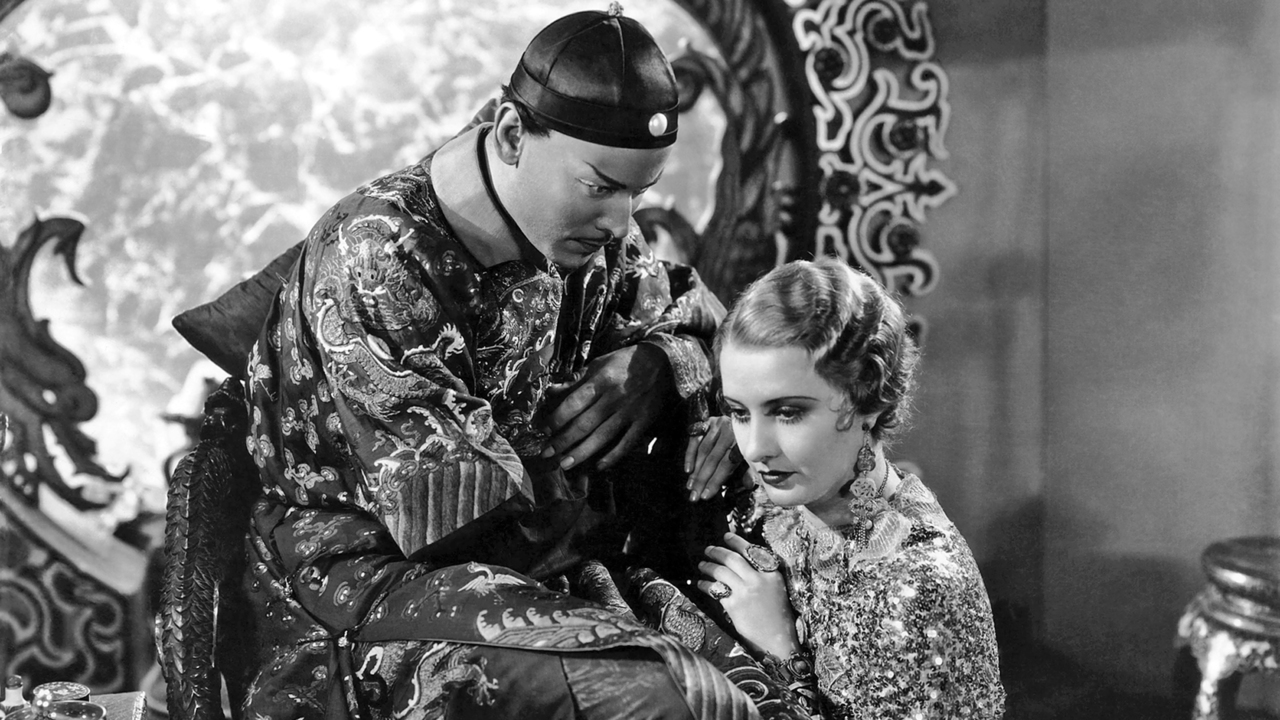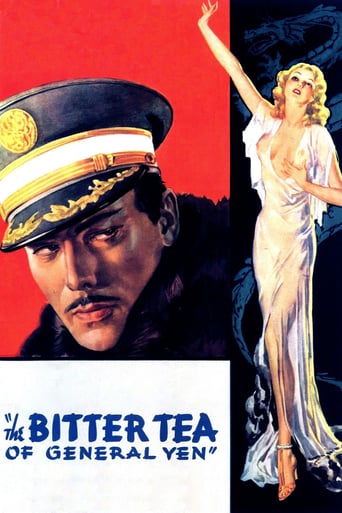

This Capra film is wonderfully deceptive; while it delivers all the sentimentality that one expects from this director, it also gives the viewer a whole new level of pragmatism that is not usually apparent in Capra's stories.A young woman arrives in China to marry her missionary boyfriend. However, before the wedding can take place, she finds herself instead the captive of a powerful warlord. What plays out then is a battle of two distinct world views, one based on modernism's reverence for the self-determining individual and one based on a traditional comprehension of hierarchical values, fate and the importance of continuity.To Capra's credit, neither side of this east/west debate is shown as possessing a monopoly on truth, but there is nonetheless at the bottom of this debate a clear criticism of colonialism and western imperialism that is rare for the period.The actors are very earnest - (Spoilers) Barbara Stanwyck convinces you first of her convictions and then of their collapse, but it is Nils Asther, Danish-born Swede playing General Yen, who is really exceptional. Walter Connolly is perfect,too, as the soulless American war profiteer who's yoked himself to General Yen's rising star.No, it wasn't filmed on location, no, it didn't bother itself too much with cultural authenticity and yes, the actors can be hammy at times, but, as happens so often to me with these older films, I am amazed at the commitment to real issues, albeit presented in the fully developed guise of an ill-fated love story.
... View MoreThis picture is on TV pretty often, so often that I usually miss it. The title sounds uninviting, like a dull movie about a tea plantation. Then I saw it on a big screen last month at a film festival and I was astonished. I was especially astonished by Nils Asther's portrayal of the General, and I'm not sure I've seen him in anything else. It was a hypnotic performance, as good a job of acting as has ever been put on the Silver Screen. The film was early Stanwyck but she was as good as ever and, coupled with Asther, they worked magic.The picture has been reviewed about 50 times now and everyone recaps the plot. It's enough to say it is possibly Capra's best effort. I thought the pace of the film compared to "Lost Horizon", the action and energy of the opening scenes and then the placid unfolding of the main story, which in both cases turns out to be a love story - and then the knockout ending. Also noteworthy are the spectacular sets and the shimmering, immaculate photography. I saw it at Cinevent, Columbus, O., 5/13.
... View MoreFrank Capra, good director as he was, was ruthless in his ambition and self-promotion. He began, rather clumsily, as a showy visual director. He quickly realised however that he would get more kudos by refining and restraining his technique. By 1933, he had gained a substantial reputation and enough weight at Columbia studios to push for his own projects. He decided what he would like next was an Academy Award, and thus plumped for this sweeping love story set in foreign climes, conspicuously lavish and action-filled in the cash-strapped early 30s, especially by the standards of "poverty row" studio Columbia. Surely, he no doubt thought, this would strike Oscar gold.Carpa chose for his star the rising and now very bankable Barbara Stanwyck. Stanwyck's greatest asset it seems was her ability to show great emotion, even fiery rage, without once slipping into hammy hysterics. She is all cool passion, and it is very effective here. Nils Asther, in the title role, is very good too. He is a little theatrical and stylised in his gesture and mannerisms, but like Stanwyck he is calm and restrained, and certainly resists any temptation to turn the Mandarin general into a crude stereotype. And yet he is full of character. There's one great moment, where he stuffs an unwanted cigarette into the mouth of a guard without even looking round, as casually as if the man was an ashtray. Importantly, Stanwyck and Asther have great chemistry, and the performances all round are very fine.Carpa himself is obviously trying hard to load the picture with style and atmosphere, with moody lighting and a roving camera. One of his best techniques seems to have been perfected here, and that is his one of having the camera amidst a group of people like an imaginary extra person on the set. A really excellent example of this is in the first scene where the pastor makes his speech. The camera stays fixed, while a number of other silhouetted figures stop to listen. This has the dual function of making us feel like we are part of this community, and of drawing attention to the man and his words. The shot is punctuated by a neat whip pan into a close-up of a Chinese man's face. There is a feeling however that Capra is trying to turn every moment into a climax, and pretty soon the exquisite shot compositions and endless whip pans start to dull in effect. The dream sequence in particular could have been a little less heavy-handed.All in all, Capra has made a decent little film here. Minimal lighting and a tight editing pattern has cunningly disguised what is actually rather a low budgeted affair. Eerie sound design contributes a lot to the mysterious, oriental feel. But in spite of all the director's best intentions, The Bitter Tea of General Yen was a flop which received exactly zero Oscar nominations. Ironically, while today some may object to Asther performing in yellowface, at the time it was frowned upon for its positive portrayal of interracial love. It is also ironic that, despite all his hopes being pinned on this one, a different Capra movie (Lady for a Day) was nominated for Best Picture and Best Director. Lady for a Day is far less ostentatious, but it is a lot more like the homely heart-warming fare for which Capra would later be known. Was Lady for a Day really better received because it was up Capra's street, so to speak? Or did Capra deliberately re-brand himself in the mould of his first Oscar success?
... View MoreI would describe this film as sumptuous, erotic, sophisticated and emotionally complex. It is a 1933 Frank Capra film, about a love affair between a Christian missionary's fiancée and an educated Chinese warlord, a film which broke the taboo against depicting inter-racial relationships just prior to the introduction of the reactionary Hayes code in Hollywood.As a work of film craftsmanship and artistry it is just breath-taking - starting with the initial scenes of chaos in the midst of a bombing raid where Megan Davis (Barbara Stanwyk) makes her first impression on General Yen through a small act of kindness. The crowd scenes are masterfully directed and the photography positively glows. Later on, watch the superimposition of images as they gradually hover around Megan's face, suggesting a dream state. Then, in the train compartment, the three main characters are assembled - Megan, General Yen, and Yen's concubine, Mah-Li. Without a word being spoken the camera prowls among the three characters catching every little nuance of the eyes and body language as they react to one another. It is very intimate - almost uncomfortably so - and very dramatic. There is a dream sequence of Megan's later in the film, too. I will not spoil it for you, but it is provocative and jaw-dropping, and it must have caused gasps in the audience back in 1933.The film is somewhat a psychological dance among the main characters. None of them is quite who they seem to be or even who they think they are. As General Yen's fortunes decline Megan's dearly held Christian beliefs seem overwhelmed by a tragic set of events that she has no control over but which she is inexorably a part of. Even when she is compelled to bargain for the Christian ideal of mercy, Yen is stung, fearing he is being "taken" by a missionary type, while loving said missionary type so passionately. Nils Asther's performance as Yen is, at this point, heartbreaking.It has been commented that several Chinese in the Christian household at the beginning of the film appear in shadow and are depicted as sinister. That is not my take on it at all. If anything, this film is anti-racist .Those Chinese servants in shadows are depicted as being practically invisible to the whites at the party - people you snap your fingers at if you want an hors-d'oeuvre or the piano played. David Lean did something similar in "A Passage to India" decades later. Toshia Mori, as Mah-Li, plays a fully-developed character, and adds considerable weight to the authenticity of the movie. Oh, and Walter Connolly, as the resident white scumbag, fatuous as he may sound, delivers a lot of wisdom and expert postulating, particularly at the end. He's a one-man Greek chorus.
... View More